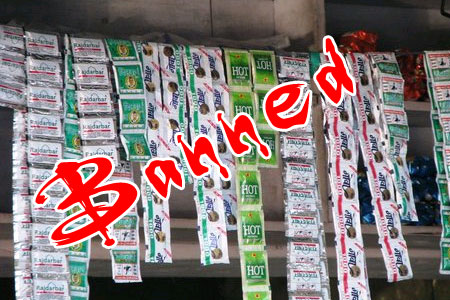
Vivek Kaul
One of the things about having grown up in erstwhile Bihar was that I ended up with the habit of having paan now and then. For brief periods of time it would turn into an addiction and I needed my paan right after lunch.
Nearly 10 years back, while working in Hyderabad my paan-eating habit was at its peak. I went out for my afternoon paan right after a heavy lunch. On one such occasion, while I was waiting for the paanwallah to make my daily fix, someone came and stood next to me. In chaste Hyderabadi Hindi he asked the paanwallah – “kya miyan unne rakhe kya?”
The paanwallah, who till then was sitting cross-legged, quietly got down and suddenly put his hand next to his crotch. For a moment I was too shocked at the scene that was playing out in front of me. The paanwallah then quietly handed over something wrapped in polythene and was handed over a Rs 10 note in exchange.
Once the exchange was over I asked the paanwallah “kya diya usko?”
“Gutka!” the paanwallah replied.
In March 2002, the state of Andhra Pradesh had banned the sale of gutka. But such was the addiction of the people that gutka never really stopped selling in the state, and the system simply went underground. You could buy gutka packets at almost any paan shop in Hyderabad.
The only thing that had changed was that the price had more than doubled. Everybody made more money in the process. The police turned a blind eye to this menace because they had bigger criminals to catch. And at the end of the day how many paanwallahs could they have put in jail? Also, while I have no concrete proof for this, I am sure that the local hawaldars must have been kept happy by passing them a share of the increased profits. The gutka manufactures pleaded ignorance by saying that the packets were being smuggled into Hyderabad and Andhra Pradesh from the other neighbouring states where the sales weren’t banned.
So everybody made more money in the process. The gutka consumer lost out because he had to pay a higher price for his addiction, but then he really didn’t mind. The government lost out on the taxes that would have come from official gutka sales.
The government’s reasoning in banning the sale of gutka was simple. The decision was made in the interest of public health. The loss in tax revenue for the government was thus secondary. Using similar logic the government of Maharashtra recently banned the sale of gutka in the state. While at face-level this might seem like the “right” thing to do, it doesn’t really work.
Gutka is also banned in Kerala, Madhya Pradesh, Bihar and Uttar Pradesh. Maharasthra has also banned pan masala, becoming the first state in India to do so.
Bans to stop people from consuming products that are injurious to their health have never really worked in this country. Manufacture, sale or consumption of alcohol has been banned in Gujarat since 1960. But as anyone who has lived in Gujarat long enough will tell you, sourcing any kind of alcoholic drink isn’t a problem. You just need to know the right person who can home-deliver it.
The charismatic NT Rama Rao implemented prohibition in 1994 after an anti-liquor movement spearheaded by women grew across the state. The men never really stopped drinking. Liquor continued to be available and was simply smuggled into the state from the neighbouring states.
N Chandrababu Naidu, son-in-law of NTR, became the Chief Minister in 1997. He revoked prohibition on the pretext that it was “not successful or feasible because of the leakages within the state and from across the borders”.
Haryana implemented prohibition in mid-1996 and lost out on Rs 1,200 crore of tax revenue during the period. The drinkers simply moved to drinking in neighbouring Delhi and Punjab during the period.
When states ban consumption of alcohol, or gutka for that matter, they are following what the Directive Principles of State Policy envisaged when the constitution of India was made. Article 47 of the Directive Principles of State Policy states, “The state shall endeavour to bring about prohibition of the use, except for medicinal purposes, of intoxicating drinks and of drugs which are injurious to health.”
But such bans have never really worked. The government doesn’t have the administrative machinery required to implement such bans. Also, leakages from neighbouring states ensures that the supply of the banned good never really stops, be it gutka, pan masala or alcohol for that matter. In fact, with more profits to be made the risk of smuggling becomes increasingly lucrative.
Given these reasons, the ban on gutka and pan masala in Maharashtra will have no real impact accept moving their sales underground. The consumer addicted to it will readily pay more for the product. The government will lose out on the tax revenue.
The only way to ensure that the ban works is to have a nationwide ban and systematically ensure that no gutka-pan masala is produced or sold in this country. But that again is easier said than done. A lot of state governments may not be ready to lose out on the revenue that the sales of these products brings in. Moreover, what is to stop its smuggling from Nepal or Bangladesh? It also raises the question: why stop at banning gutka-pan masala and alcohol. What about banning cigarettes and bidis as well?
(The article originally appeared on www.firstpost.com on July 13,2012. http://www.firstpost.com/india/why-the-gutka-ban-in-maharashtra-wont-work-376475.html)
Vivek Kaul is a writer and can be reached at [email protected]